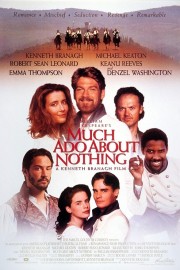Much Ado About Nothing (’93)
For a time, Kenneth Branagh was the foremost filmmaker of William Shakespeare since Sir Laurence Olivier, whom, in a shade of irony, he would be Oscar-nominated for playing in “My Week With Marilyn.” The past decade, he has become better known for hammy performances in the likes of “Wild Wild West,” “Harry Potter and the Chamber of Secrets,” Woody Allen’s “Celebrity,” as well as directing the Marvel origin epic, “Thor,” but from 1989 (with “Henry V”) to 1996 (with his un-abridged “Hamlet”), he was known as a master author of cinematic Shakespeare. He would adapt a couple of other of the Bard’s plays after “Hamlet,” but neither were as well-known as his films during this 7-year period.
I watched his 1993 adaptation of Much Ado About Nothing in high school English class, and I must admit, it did make an impression. When another Marvel alum, Joss Whedon, announced that he had done his own adaptation of the play, it seemed like a good time to rewatch Branagh’s movie of the romantic tangles of Benedick and Beatrice, a pair of cynics when it comes to love who, nonetheless, become romantically entwined during a weekend in the Italian city of Messina. I ended up watching Whedon’s film first, which was probably wise, if only because it helped ease me into Branagh’s film after so long.
Watching the newer film first, however, didn’t do Branagh’s any favors, however. There’s an artifice I felt with the older film that I’m not sure whether I would have seen in it had I watched it again before seeing Whedon’s film. Of course, it’s entirely possible my memories of watching the film roughly 20 years ago were glossed over with a sort of nostalgia. This is much more of a traditional adaptation of Shakespeare, with a classical setting and a mostly-British, theatrically-trained cast starting with Branagh and his wife at the time, Emma Thompson, starring as Benedick and Beatrice. The production design is period through and through, and the score by Patrick Doyle, well, let’s just say it doesn’t hold anything back.
These trappings aside, however, Branagh’s “Much Ado About Nothing” is a delight. Part of that is because of the material itself, which is rightfully among Shakespare’s most popular works, but it’s also due to the performances. Yes, there’s a lot of traits of stage acting throughout the cast, which leads to some overwrought moments, but this is a wonderful cast Branagh has assembled. Of course, there is Thompson and he at the center, and they are delightful in their scenes together, but beyond that, we have: Denzel Washington as the noble Don Pedro, who hatches the plan to bring Benedick and Beatrice together; Kate Beckinsale as Beatrice’s cousin, Hero; Michael Keaton as the odd constable, Dogberry (arguably my favorite performance, because it shows how versatile the actor is, and makes me wish he was in more now); and Keanu Reeves as the scheming Don John, so unhappy in his station that he plots to ruin the pending marriage between Hero and Count Claudio. As much as the actors seem to overact, they get to the heart of this most romantic tale, and leave us with a feeling of unabashed joy. This, I do remember from my earlier experience of watching the film, and it remains still.










